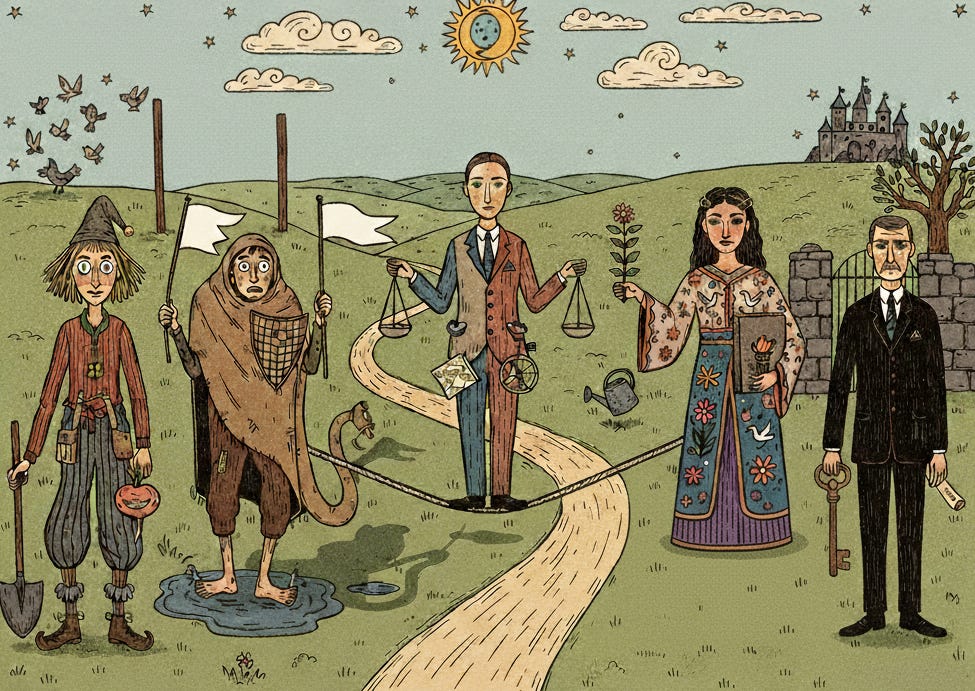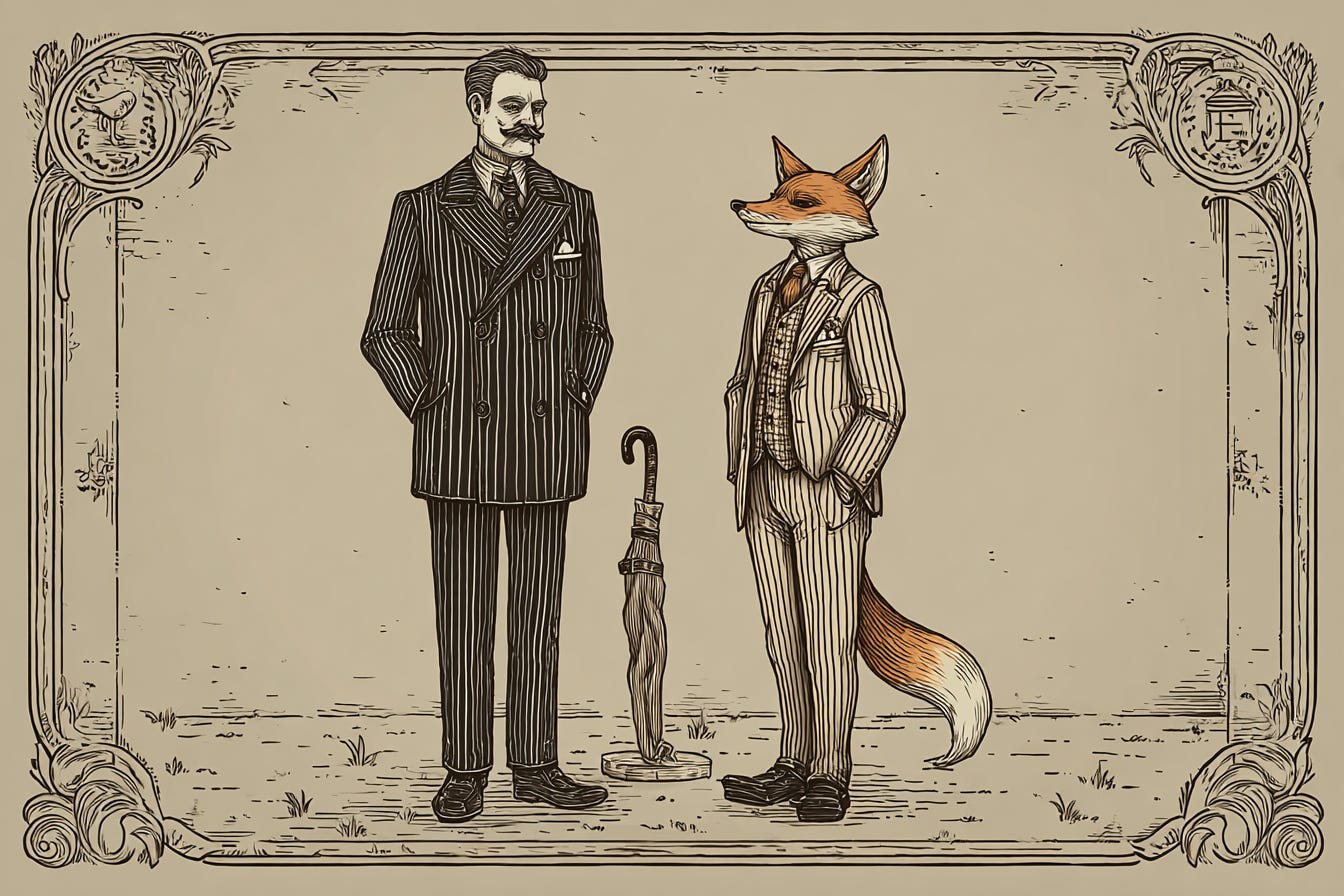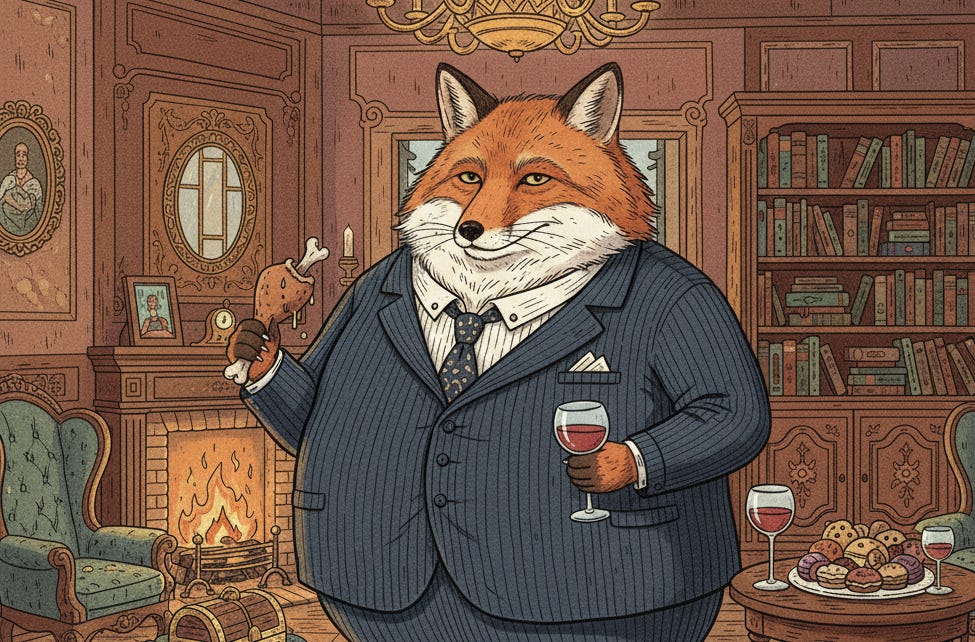The Idiot Grift
A brief metaphor for how we got here
Inside this issue:
There once was a village …
Along came a Grifter
It’s a big club and you ain’t in it
There once was a village …
There once was a village of only five people: the Idiot, the Coward, the Centrist, the Liberal and the Conservative. When the town needed to make important decisions, they would have a debate and take a vote. Everyone agreed this was the fairest way to make decisions.
The Liberal and the Conservative cared the most, but they usually disagreed with each other so they would often argue. Sometimes the Liberal was able to convince the Conservative, sometimes the Conservative was able to convince the Liberal and sometimes the right answer was obvious to both of them. When that happened, making decisions was easy.
Mostly though, they disagreed. When that happened, they each would try to convince the other villagers of their opinion. The Coward was too afraid to commit to opinions unless they were already held by the majority. The Centrist had some opinions, but was more annoyed by the debate than concerned about making the right decision. The Idiot could be convinced of anything, but only by using terrible arguments that everyone else knew made no sense. The Idiot liked stories more than logic — especially stories that made them feel smart and powerful.
So for a while the town made decisions like this: the Liberal and the Conservative would try to convince each other with good arguments and if that didn’t work they would try to convince the Idiot with bad arguments. Soon it became obvious that it was much easier to convince the Idiot with bad arguments than it was to convince anyone else with good arguments. Eventually both the Liberal and the Conservative stopped bothering to convince each other and focused their efforts exclusively on convincing the Idiot.
Over time that meant more and more decisions were being made by the Idiot. That was alarming to both the Liberal and the Conservative, but it was still easier to convince the Idiot than to argue with each other or convince the Centrist or the Coward to take a stance. And it was balanced, because generally the Idiot was unpredictable — they tended to make mistakes equally in both directions.
Then one day a Grifter moved to town.
Along came a Grifter
The Grifter told everyone that he was a Conservative. The Idiot believed him. The Coward chose not to question it. The Centrist didn’t care. The Conservative knew the Grifter wasn’t really a Conservative, but figured it was useful to have someone who agreed with them even if he wasn’t totally sincere. The Liberal knew something was suspicious, but didn’t know what it meant.
At first this was great for the Conservative. When it was time to make a decision the Grifter (almost) always agreed with the Conservative! The Grifter was also much better at convincing the Idiot, because the Grifter was a skilled liar and all the Idiot’s favorite stories were lies. After that it was easy for the three of them to convince the Coward that there was a clear majority and convince the Centrist that the Liberal was a fringe activist creating unnecessary debate.
But the Grifter wasn’t really Conservative and making the town Conservative wasn’t really his priority. The Grifter only cared about money. So instead of convincing the Idiot to support Conservative decisions, he focused on convincing the Idiot that the Liberal was a dangerous enemy. That was easier for the Grifter and more motivating for the Idiot.
The Conservative knew better. The Liberal and the Conservative disagreed on many things, but they both loved the town and for a long time they had worked together to make it a better place. On the other hand, making the Liberal seem scary made the Idiot really easy to manipulate – so the Conservative bit their tongue. The Coward was too afraid to say anything and the Centrist wasn’t listening.
With no one pushing back on his lies, the Grifter grew bolder. Soon he was telling the Idiot not just that the Liberal was their enemy but that the Conservative was an unreliable ally and perhaps not even a true Conservative at all. Everyone except the Idiot knew neither the Grifter nor the Idiot were actually Conservative – but it didn’t matter. The Grifter had stolen the name 'Conservative' and changed what it meant.
The Grifter’s logic made no sense, but that didn’t matter either because he didn’t need to convince anyone but the Idiot. The Coward was too afraid to challenge anything, the Centrist didn’t notice, and the Liberal and Conservative had fought so bitterly for so long they had forgotten how to work together. Now every decision in town was being made by the Idiot agreeing with the Grifter. The town was neither Liberal nor Conservative. It had become an Idiot Grift.
It’s a big club and you ain’t in it
Everything got worse for everyone (except for the Grifter). The Idiot didn't understand why and the Centrist didn’t care. The Coward knew why but never spoke up. The Liberal and the Conservative blamed each other.
It took the Conservative a long time to realize that they had been grifted, too. Those early policy victories weren’t about a shared vision for the future – they were, in retrospect, bait. The Grifter just wanted to co-opt the Conservative’s reputation to make their bad arguments seem more credible to the Idiot.
It took the Liberal a long time to realize they had been grifted, too. The anger they felt for the Idiot (for neglecting their interests) and the Conservative (for neglecting their principles) was, in retrospect, bait. Blaming the Conservative and the Idiot for the sins of the Grifter just made it easier for the Grifter to paint them as villainous scolds.
The Coward always knew and the Centrist never cared. But the Liberal, the Conservative and the Idiot were all marks. None of them were in on it. None of them were above it. None of them were outside it.
None of them had escaped it.
Fortunately this is not a very realistic story.
In the real world the town would be mostly Idiots.






Well said and an excellent read
I’ve been trying to figure out how we got here for a while, and this laid it out so cleanly in a way that rings true.